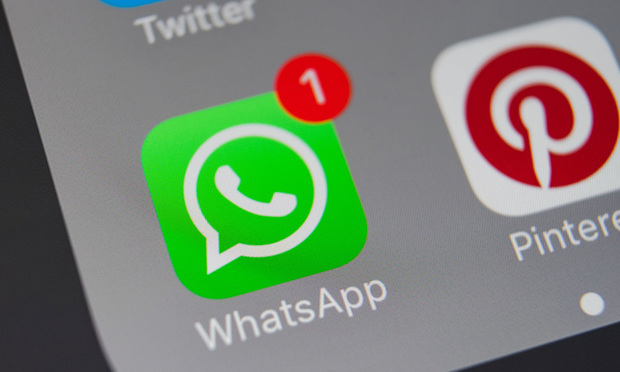US Justice Dept. Wins 'WhatsApp' Surveillance Order on Appeal
A Washington federal judge this month granted the U.S. Justice Department permission to surveil a WhatsApp account as part of an ongoing criminal investigation, a decision that overruled a magistrate judge.
March 19, 2018 at 12:22 PM
4 minute read

Updated on March 19 at 3:28 p.m.
A federal judge this month granted the U.S. Justice Department permission to surveil a WhatsApp account as part of an ongoing criminal investigation, a decision that overruled a magistrate judge who had denied the government's request to track communications over the encrypted messaging and internet calling service.
The decision by Chief U.S. District Judge Beryl A. Howell in Washington allowed the government to install so-called pen register and trap and trace devices to capture the phone numbers dialed by the WhatsApp user, identified only as “one of several subjects of an ongoing criminal investigation, and also the phone numbers or internet addresses of incoming calls.
Those devices, often referred to together as a “PRTT,” do not give the government access to the content of communications.
Howell's decision, dated March 2 but unsealed last week, overruled a February decision from Magistrate Judge Deborah Robinson, who earlier denied the Justice Department's application to use those surveillance devices on the WhatsApp user's account. Robinson, in her Feb. 5 decision, said the government needed to provide more information than just the WhatsApp account number.
Robinson specifically requested the cellular number linked to the WhatsApp account and the identity of the user's cellular service provider. Just days earlier, she had denied six other applications on similar grounds, ruling that the government was “seemingly utilizing 'WhatsApp' and 'Service Provider' interchangeably.”
The Justice Department followed up to clarify that WhatsApp account numbers are the same as users' phone numbers and that WhatsApp itself was the relevant service provider. On Feb. 28, with no response from Robinson, the Justice Department filed an objection with Howell, citing ”the need for the order as part of an ongoing investigation.”
Upholding that objection, Howell said the government had provided enough information by including the WhatsApp account number in its surveillance application.
“Importantly, the government is seeking only WhatsApp information—that is, 'information related to communications occurring over WhatsApp servers located in the United States,' rather than information regarding the cellular telephone number and cellular service provider for the user in question,” Howell wrote, quoting from the Justice Department's objection. “As already discussed, a WhatsApp account number is the same as the phone number used to create the WhatsApp account. Thus, by providing the WhatsApp account number, the government has 'provide[d] the cellular telephone number associated with the designated WhatsApp account,' thereby alleviating the magistrate judge's concerns.”
Howell cited WhatsApp's own policy for handling law enforcement requests for records. That policy, she said, notes that all requests must identify the desired records with “particularity” and include the WhatsApp account number.
“That number, which is also the cellular telephone number for the user at issue, properly was provided in the government's application,” Howell wrote.
A WhatsApp spokesperson on Monday declined to comment.
This post was updated with additional information about the judge's order.
Read Howell's ruling, posted below:
Read more:
6 Cyber and Privacy Suits We're Watching
Justices' Heads Were in the Cloud at Microsoft Email Arguments
Microsoft's Head of Litigation on the Company's Fight at SCOTUS
After Memo, New York Times Asks Secret Court for Carter Page Warrants
With End-to-End Encryption, Compliance Trouble Brewing for Legal
This content has been archived. It is available through our partners, LexisNexis® and Bloomberg Law.
To view this content, please continue to their sites.
Not a Lexis Subscriber?
Subscribe Now
Not a Bloomberg Law Subscriber?
Subscribe Now
NOT FOR REPRINT
© 2025 ALM Global, LLC, All Rights Reserved. Request academic re-use from www.copyright.com. All other uses, submit a request to [email protected]. For more information visit Asset & Logo Licensing.
You Might Like
View All
Weil Adds Acting Director of SEC Enforcement, Continuing Government Hiring Streak
3 minute read

Law Firms Expand Scope of Immigration Expertise Amid Blitz of Trump Orders
6 minute readTrending Stories
- 1Second Judge Blocks Trump Federal Funding Freeze
- 2Crypto Hacker’s $65 Million Scam Ends in Indictment
- 3Trump's Inspectors General Purge Could Make Policy Changes Easier, Observers Say
- 4Supporting Our Supreme Court Justices in the Guardianship Part
- 5'Erroneous Rulings'?: Wilmer Asks 4th Circuit to Overturn Mosby's Criminal Convictions
Who Got The Work
J. Brugh Lower of Gibbons has entered an appearance for industrial equipment supplier Devco Corporation in a pending trademark infringement lawsuit. The suit, accusing the defendant of selling knock-off Graco products, was filed Dec. 18 in New Jersey District Court by Rivkin Radler on behalf of Graco Inc. and Graco Minnesota. The case, assigned to U.S. District Judge Zahid N. Quraishi, is 3:24-cv-11294, Graco Inc. et al v. Devco Corporation.
Who Got The Work
Rebecca Maller-Stein and Kent A. Yalowitz of Arnold & Porter Kaye Scholer have entered their appearances for Hanaco Venture Capital and its executives, Lior Prosor and David Frankel, in a pending securities lawsuit. The action, filed on Dec. 24 in New York Southern District Court by Zell, Aron & Co. on behalf of Goldeneye Advisors, accuses the defendants of negligently and fraudulently managing the plaintiff's $1 million investment. The case, assigned to U.S. District Judge Vernon S. Broderick, is 1:24-cv-09918, Goldeneye Advisors, LLC v. Hanaco Venture Capital, Ltd. et al.
Who Got The Work
Attorneys from A&O Shearman has stepped in as defense counsel for Toronto-Dominion Bank and other defendants in a pending securities class action. The suit, filed Dec. 11 in New York Southern District Court by Bleichmar Fonti & Auld, accuses the defendants of concealing the bank's 'pervasive' deficiencies in regards to its compliance with the Bank Secrecy Act and the quality of its anti-money laundering controls. The case, assigned to U.S. District Judge Arun Subramanian, is 1:24-cv-09445, Gonzalez v. The Toronto-Dominion Bank et al.
Who Got The Work
Crown Castle International, a Pennsylvania company providing shared communications infrastructure, has turned to Luke D. Wolf of Gordon Rees Scully Mansukhani to fend off a pending breach-of-contract lawsuit. The court action, filed Nov. 25 in Michigan Eastern District Court by Hooper Hathaway PC on behalf of The Town Residences LLC, accuses Crown Castle of failing to transfer approximately $30,000 in utility payments from T-Mobile in breach of a roof-top lease and assignment agreement. The case, assigned to U.S. District Judge Susan K. Declercq, is 2:24-cv-13131, The Town Residences LLC v. T-Mobile US, Inc. et al.
Who Got The Work
Wilfred P. Coronato and Daniel M. Schwartz of McCarter & English have stepped in as defense counsel to Electrolux Home Products Inc. in a pending product liability lawsuit. The court action, filed Nov. 26 in New York Eastern District Court by Poulos Lopiccolo PC and Nagel Rice LLP on behalf of David Stern, alleges that the defendant's refrigerators’ drawers and shelving repeatedly break and fall apart within months after purchase. The case, assigned to U.S. District Judge Joan M. Azrack, is 2:24-cv-08204, Stern v. Electrolux Home Products, Inc.
Featured Firms
Law Offices of Gary Martin Hays & Associates, P.C.
(470) 294-1674
Law Offices of Mark E. Salomone
(857) 444-6468
Smith & Hassler
(713) 739-1250









